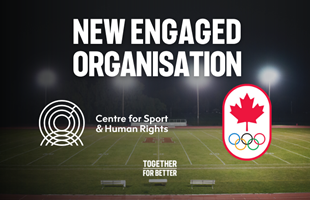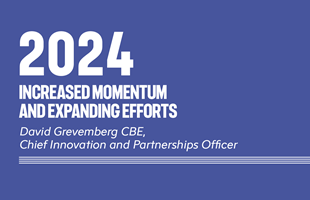5 Sport and Human Rights Issues to Look Out For in 2021
01 Jan 2021
Author - Centre for Sport and Human Rights
1. RESPONDING TO COVID-19
The impacts of the COVID-19 pandemic on sport have been severe, from its finances to its wider societal outcomes. Stadiums have been empty, athletes have been training and competing in isolation, or not at all. Many people, especially children and youth, have lost opportunities to participate in sport. The pandemic has changed the face of sport, and its effects will be felt for years to come.
As long as the pandemic lasts, sport will be played mainly behind closed doors and workarounds such as frequent testing of athletes and league “bubbles” will continue. COVID-19 has set in motion key trends for 2021 and beyond. These include:
- Expanding digital engagement - Sports bodies and leagues were pivoting online before the pandemic as more fans turned to streaming platforms over live TV or physical attendance. The pandemic will accelerate this trend as sports bodies explore creative ways to engage fans digitally. It is also likely to change revenue models for sports that rely on ticket sales, such as women’s football.
- Increasing scrutiny of government sport spending - COVID-19 has made painfully clear how women’s sport or sport for persons with disabilities among others are critically underfunded. As sport’s financial recovery begins next year, more attention will be directed at where governments spend limited financial resources.
- Continuing access to sport - The economic collapse and loss of jobs threaten people’s access to sport and physical fitness. This can be seen in funding cuts, particularly for grassroots and sport for development programmes. Loss of funding will hit children particularly hard as they are often the main beneficiaries of programmes and so long-term effects may not be fully known for several years.
- Addressing long-term impacts of COVID-19 - The effects of the virus on people’s health over time are still largely unknown with stories of “long Covid”, relapses and difficulty getting back to everyday life. This has potentially serious implications for athlete health and performance in the years ahead.
2. CONFRONTING ATHLETE ABUSE
Abuse scandals across sport made headlines this year. Protecting the safety, dignity and wellbeing of athletes will remain a major topic for 2021.
A particular focus is likely to be improved structures for reporting and investigating abuse, with calls for greater independence and better understanding of how to support and include survivors and victims.
Responding to more allegations of horrific and widespread sexual abuse of girls and young women by some of football’s most established and senior figures, FIFA announced a consultation process “with the objective of establishing an independent, multi-sports, multi-agency international entity to investigate abuse cases in sports”.
While an encouraging step, such initiatives need to ensure broad-based consultations that are independent and fit for purpose, and active ongoing involvement of human rights experts and other stakeholders alongside sporting entities to help keep athletes safe.
3. TAKING ON SPORTWASHING
With greater state investment into sports clubs, and events taking place in countries with poor human rights records, scrutiny will continue over where ownership, broadcasting and sponsorship dollars come from. Examples include the attempt by the Saudi Public Investment Fund to takeover Newcastle United FC, and the Kingdom ramping up its hosting of sporting events including boxing, golf, and more recently, being added to the F1 Grand Prix Circuit. All this despite the government’s deplorable human rights record. China continues to bid for major events, despite a worsening human rights situation and Belarus, which is set to host the Ice Hockey World Championships, has actively targeted and arrested high-profile athletes for speaking out against the government in this summer’s protests.
For 2021 and beyond this means:
- Human rights due diligence in awarding hosting rights - Bidding for sporting events should be open to all, but that should not mean countries can bypass accountability and criticism. Sports bodies need to do due diligence and hold host countries and cities accountable.
- Increased scrutiny for sports financing - The attempted Newcastle United takeover raised significant questions on who should own clubs and it is unlikely to be the last time such an attempt is made. Scrutiny on owners should also be extended to broadcasters and sponsors.
- Stronger use of leverage by key actors in sport - Broadcasters and sponsors should conduct their own due diligence in relation to their agreements to provide financing to sport events, and work to ensure the rights of people are upheld where events are held. Sponsors and broadcasters also have significant leverage with respect to hosts and organisers and can be important stakeholders to open dialogue on human rights issues.
4. ENSURING RIGHTS RESPECTING E-SPORTS
While 2020 was marked by many sports being unable to host events, the E-sports industry has seen significant growth in numbers of people participating and gaming options. This development will continue in 2021.
Sports governing bodies are adapting to the change in platform possibilities. The landscape will start to look different as federations look to repeat the success of digital activations like the Virtual Tour de France.
A report from Oxford University suggested that playing video games could have a positive impact on a person’s well-being. Where E-sport is concerned, however, greater understanding of the human rights implications is still needed, and the establishment of standards to protect players and spectators is an urgent challenge. In 2021, new tools and resources are needed to safeguard children while playing and in ways that provide necessary data protections. Children’s views must be sought to identify where protection gaps exist beyond the important attention to the commercial sexual exploitation of children.
5. SUPPORTING ATHLETE ACTIVISM
The past 12 months has brought athlete activism into sharper focus, especially for a new generation. Professional athletes are increasingly taking a stand in organised and coordinated ways on issues that impact them and wider society. High profile examples have included taking the knee at the start of Premier League football matches, and social justice messages on NBA jerseys. Athletes including Naomi Osaka and Lewis Hamilton have added their voices to the Black Lives Matter movement, and Marcus Rashford has highlighted challenges facing low-income children during the pandemic.
2021 will see the postponed Tokyo Olympics, but the IOC will also need to make a decision on amendments to Rule 50, which currently prohibits “demonstration or political, religious or racial propaganda”. All sport organisations have a responsibility to ensure that athletes’ fundamental rights, including freedom of expression, are respected and in ways that ensure respect for the rights and reputations of others. Many organisations have begun consultations with athletes on this issue and will finalise new rule recommendations by early 2021. These reforms will likely bring significant changes in the way athletes view their platform and how they use it.



